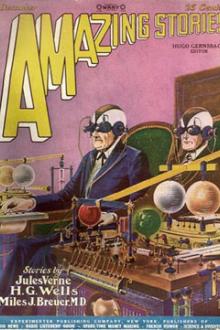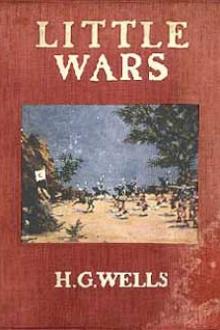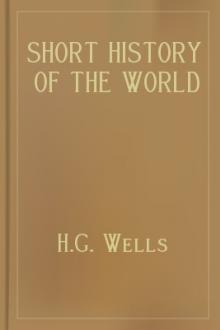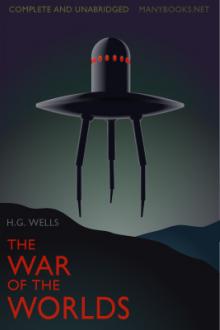author - "H. G. Wells"

ally hot). This was Warming, a London solicitor and next of kin to Graham, the man who had fallen into the trance. And the two men stood side by side in a room in a house in London regarding his recumbent figure.
It was a yellow figure lying lax upon a water-bed and clad in a flowing shirt, a figure with a shrunken face and a stubby beard, lean limbs and lank nails, and about it was a case of thin glass. This glass seemed to mark off the sleeper from the reality of life about him, he was a thing apart, a strange, isolated abnormality. The two men stood close to the glass, peering in.
"The thing gave me a shock," said Isbister "I feel a queer sort of surprise even now when I think of his white eyes. They were white, you know, rolled up. Coming here again brings it all back to me.
"Have you never seen him since that time?" asked Warming.
"Often wanted to come," said Isbister; "but business nowadays is too serious a thing for much holiday keeping. I've been in America most of the time

d the ray, and that the crystal none the less remained luminous. Greatly astonished, he lifted it out of the light ray and carried it to the darkest part of the shop. It remained bright for some four or five minutes, when it slowly faded and went out. He placed it in the thin streak of daylight, and its luminousness was almost immediately restored.
So far, at least, Mr. Wace was able to verify the remarkable story of Mr. Cave. He has himself repeatedly held this crystal in a ray of light (which had to be of a less diameter than one millimetre). And in a perfect darkness, such as could be produced by velvet wrapping, the crystal did undoubtedly appear very faintly phosphorescent. It would seem, however, that the luminousness was of some exceptional sort, and not equally visible to all eyes; for Mr. Harbinger--whose name will be familiar to the scientific reader in connection with the Pasteur Institute--was quite unable to see any light whatever. And Mr. Wace's own capacity for its appreciation was out o

am, is a teetotaller. Yes, m'm; and he don't smoke. Smoking, ma'am," said Jane, as one who reads the heart, "do make such a dust about. Beside the waste of money. And the smell. However, I suppose they got to do it--some of them..."
William was at first a rather shabby young man of the ready-made black coat school of costume. He had watery gray eyes, and a complexion appropriate to the brother of one in a Home for the Dying. Euphemia did not fancy him very much, even at the beginning. His eminent respectability was vouched for by an alpaca umbrella, from which he never allowed himself to be parted.
"He goes to chapel," said Jane. "His papa, ma'am----"
"His what, Jane?"
"His papa, ma'am, was Church: but Mr. Maynard is a Plymouth Brother, and William thinks it Policy, ma'am, to go there too. Mr. Maynard comes and talks to him quite friendly when they ain't busy, about using up all the ends of string, and about his soul. He takes a lot of notice, do Mr. Mayn

r a detachment shall beconsidered to be isolated when there is less than half its number of itsown side within a move of it. Now, in actual civilised warfare smalldetached bodies do not sell their lives dearly; a considerably largerforce is able to make them prisoners without difficulty. Accordingly wedecided that if a blue force, for example, has one or more men isolated,and a red force of at least double the strength of this isolateddetachment moves up to contact with it, the blue men will be consideredto be prisoners.
That seemed fair; but so desperate is the courage and devotion of leadsoldiers, that it came to this, that any small force that got or seemedlikely to get isolated and caught by a superior force instead of waitingto be taken prisoners, dashed at its possible captors and slew themman for man. It was manifestly unreasonable to permit this. And inconsidering how best to prevent such inhuman heroisms, we were remindedof another frequent incident in our battles that also erred tow

is a length of time that absolutely overpowers the imagination.
Before that vast period of separate existence, the sun and earth and the other planets that circulate round the sun may have been a great swirl of diffused matter in space. The telescope reveals to us in various parts of the heavens luminous spiral clouds of matter, the spiral nebulae, which appear to be in rotation about a centre. It is supposed by many astronomers that the sun and its planets were once such a spiral, and that their matter has undergone concentration into its present form. Through majestic aeons that concentration went on until in that vast remoteness of the past for which we have given figures, the world and its moon were distinguishable. They were spinning then much faster than they are spinning now; they were at a lesser distance from the sun; they travelled round it very much faster, and they were probably incandescent or molten at the surface. The sun itself was a much greater blaze in the heavens.
{6}

ter took up the portfolio, opened it, put it down, hesitated, seemed about to speak. "Perhaps," he whispered doubtfully. Presently he glanced at the door and back to the figure. Then he stole on tiptoe out of the room, glancing at his companion after each elaborate pace.
He closed the door noiselessly. The house door was standing open, and he went out beyond the porch, and stood where the monkshood rose at the corner of the garden bed. From this point he could see the stranger through the open window, still and dim, sitting head on hand. He had not moved.
A number of children going along the road stopped and regarded the artist curiously. A boatman exchanged civilities with him. He felt that possibly his circumspect attitude and position looked peculiar and unaccountable. Smoking, perhaps, might seem more natural. He drew pipe and pouch from his pocket, filled the pipe slowly.
"I wonder," ... he said, with a scarcely perceptible loss of complacency. "At any rate one must give him a chance

"So much pettiness," he explained; "so much intrigue! And really, when one has an idea--a novel, fertilising idea--I don't want to be uncharitable, but--"
I am a man who believes in impulses. I made what was perhaps a rash proposition. But you must remember, that I had been alone, play-writing in Lympne, for fourteen days, and my compunction for his ruined walk still hung about me. "Why not," said I, "make this your new habit? In the place of the one I spoilt? At least, until we can settle about the bungalow. What you want is to turn over your work in your mind. That you have always done during your afternoon walk. Unfortunately that's over--you can't get things back as they were. But why not come and talk about your work to me; use me as a sort of wall against which you may throw your thoughts and catch t

hin, so that we bent towards one another and spared our words. I stood out against it with all my might, was rather for scuttling the boat and perishing together among the sharks that followed us; but when Helmar said that if his proposal was accepted we should have drink, the sailor came round to him.
I would not draw lots however, and in the night the sailor whispered to Helmar again and again, and I sat in the bows with my clasp-knife in my hand, though I doubt if I had the stuff in me to fight; and in the morning I agreed to Helmar's proposal, and we handed halfpence to find the odd man. The lot fell upon the sailor; but he was the strongest of us and would not abide by it, and attacked Helmar with his hands. They grappled together and almost stood up. I crawled along the boat to them, intending to help Helmar by grasping the sailor's leg; but the sailor stumbled with the swaying of the boat, and the two fell upon the gunwale and rolled overboard together. They sank like stones. I remember laughing

in it in a gaseous state. About it at great distances circle not only our earth, but certain kindred bodies called the planets. These shine in the sky because they reflect the light of the sun; they are near enough for us to note their movements quite easily. Night by night their positions change with regard to the fixed stars.
It is well to understand how empty is space. If, as we have said, the sun were a ball nine feet across, our earth would, in proportion, be the size of a one-inch ball, and. at a distance of 323 yards from the sun. The moon would be a speck the size of a small pea, thirty inches from the earth. Nearer to the sun than the earth would be two other very similar specks, the planets Mercury and Venus, at a distance of 125 and 250 yards respectively. Beyond the earth would come the planets Mars, Jupiter, Saturn, Uranus, and Neptune, at distances of 500, 1,680, 3,000, 6,000, and 9,500 yards respectively. There would also be a certain number of very much smaller specks, flying about amon

o recall some of the mental habits of those departed days. At most terrestrial men fancied there might be other men upon Mars, perhaps inferior to themselves and ready to welcome a missionary enterprise. Yet across the gulf of space, minds that are to our minds as ours are to those of the beasts that perish, intellects vast and cool and unsympathetic, regarded this earth with envious eyes, and slowly and surely drew their plans against us. And early in the twentieth century came the great disillusionment.
The planet Mars, I scarcely need remind the reader, revolves about the sun at a mean distance of 140,000,000 miles, and the light and heat it receives from the sun is barely half of that received by this world. It must be, if the nebular hypothesis has any truth, older than our world; and long before this earth ceased to be molten, life upon its surface must have begun its course. The fact that it is scarcely one seventh of the volume of the earth must have accelerated its cooling to the temperature a

ally hot). This was Warming, a London solicitor and next of kin to Graham, the man who had fallen into the trance. And the two men stood side by side in a room in a house in London regarding his recumbent figure.
It was a yellow figure lying lax upon a water-bed and clad in a flowing shirt, a figure with a shrunken face and a stubby beard, lean limbs and lank nails, and about it was a case of thin glass. This glass seemed to mark off the sleeper from the reality of life about him, he was a thing apart, a strange, isolated abnormality. The two men stood close to the glass, peering in.
"The thing gave me a shock," said Isbister "I feel a queer sort of surprise even now when I think of his white eyes. They were white, you know, rolled up. Coming here again brings it all back to me.
"Have you never seen him since that time?" asked Warming.
"Often wanted to come," said Isbister; "but business nowadays is too serious a thing for much holiday keeping. I've been in America most of the time

d the ray, and that the crystal none the less remained luminous. Greatly astonished, he lifted it out of the light ray and carried it to the darkest part of the shop. It remained bright for some four or five minutes, when it slowly faded and went out. He placed it in the thin streak of daylight, and its luminousness was almost immediately restored.
So far, at least, Mr. Wace was able to verify the remarkable story of Mr. Cave. He has himself repeatedly held this crystal in a ray of light (which had to be of a less diameter than one millimetre). And in a perfect darkness, such as could be produced by velvet wrapping, the crystal did undoubtedly appear very faintly phosphorescent. It would seem, however, that the luminousness was of some exceptional sort, and not equally visible to all eyes; for Mr. Harbinger--whose name will be familiar to the scientific reader in connection with the Pasteur Institute--was quite unable to see any light whatever. And Mr. Wace's own capacity for its appreciation was out o

am, is a teetotaller. Yes, m'm; and he don't smoke. Smoking, ma'am," said Jane, as one who reads the heart, "do make such a dust about. Beside the waste of money. And the smell. However, I suppose they got to do it--some of them..."
William was at first a rather shabby young man of the ready-made black coat school of costume. He had watery gray eyes, and a complexion appropriate to the brother of one in a Home for the Dying. Euphemia did not fancy him very much, even at the beginning. His eminent respectability was vouched for by an alpaca umbrella, from which he never allowed himself to be parted.
"He goes to chapel," said Jane. "His papa, ma'am----"
"His what, Jane?"
"His papa, ma'am, was Church: but Mr. Maynard is a Plymouth Brother, and William thinks it Policy, ma'am, to go there too. Mr. Maynard comes and talks to him quite friendly when they ain't busy, about using up all the ends of string, and about his soul. He takes a lot of notice, do Mr. Mayn

r a detachment shall beconsidered to be isolated when there is less than half its number of itsown side within a move of it. Now, in actual civilised warfare smalldetached bodies do not sell their lives dearly; a considerably largerforce is able to make them prisoners without difficulty. Accordingly wedecided that if a blue force, for example, has one or more men isolated,and a red force of at least double the strength of this isolateddetachment moves up to contact with it, the blue men will be consideredto be prisoners.
That seemed fair; but so desperate is the courage and devotion of leadsoldiers, that it came to this, that any small force that got or seemedlikely to get isolated and caught by a superior force instead of waitingto be taken prisoners, dashed at its possible captors and slew themman for man. It was manifestly unreasonable to permit this. And inconsidering how best to prevent such inhuman heroisms, we were remindedof another frequent incident in our battles that also erred tow

is a length of time that absolutely overpowers the imagination.
Before that vast period of separate existence, the sun and earth and the other planets that circulate round the sun may have been a great swirl of diffused matter in space. The telescope reveals to us in various parts of the heavens luminous spiral clouds of matter, the spiral nebulae, which appear to be in rotation about a centre. It is supposed by many astronomers that the sun and its planets were once such a spiral, and that their matter has undergone concentration into its present form. Through majestic aeons that concentration went on until in that vast remoteness of the past for which we have given figures, the world and its moon were distinguishable. They were spinning then much faster than they are spinning now; they were at a lesser distance from the sun; they travelled round it very much faster, and they were probably incandescent or molten at the surface. The sun itself was a much greater blaze in the heavens.
{6}

ter took up the portfolio, opened it, put it down, hesitated, seemed about to speak. "Perhaps," he whispered doubtfully. Presently he glanced at the door and back to the figure. Then he stole on tiptoe out of the room, glancing at his companion after each elaborate pace.
He closed the door noiselessly. The house door was standing open, and he went out beyond the porch, and stood where the monkshood rose at the corner of the garden bed. From this point he could see the stranger through the open window, still and dim, sitting head on hand. He had not moved.
A number of children going along the road stopped and regarded the artist curiously. A boatman exchanged civilities with him. He felt that possibly his circumspect attitude and position looked peculiar and unaccountable. Smoking, perhaps, might seem more natural. He drew pipe and pouch from his pocket, filled the pipe slowly.
"I wonder," ... he said, with a scarcely perceptible loss of complacency. "At any rate one must give him a chance

"So much pettiness," he explained; "so much intrigue! And really, when one has an idea--a novel, fertilising idea--I don't want to be uncharitable, but--"
I am a man who believes in impulses. I made what was perhaps a rash proposition. But you must remember, that I had been alone, play-writing in Lympne, for fourteen days, and my compunction for his ruined walk still hung about me. "Why not," said I, "make this your new habit? In the place of the one I spoilt? At least, until we can settle about the bungalow. What you want is to turn over your work in your mind. That you have always done during your afternoon walk. Unfortunately that's over--you can't get things back as they were. But why not come and talk about your work to me; use me as a sort of wall against which you may throw your thoughts and catch t

hin, so that we bent towards one another and spared our words. I stood out against it with all my might, was rather for scuttling the boat and perishing together among the sharks that followed us; but when Helmar said that if his proposal was accepted we should have drink, the sailor came round to him.
I would not draw lots however, and in the night the sailor whispered to Helmar again and again, and I sat in the bows with my clasp-knife in my hand, though I doubt if I had the stuff in me to fight; and in the morning I agreed to Helmar's proposal, and we handed halfpence to find the odd man. The lot fell upon the sailor; but he was the strongest of us and would not abide by it, and attacked Helmar with his hands. They grappled together and almost stood up. I crawled along the boat to them, intending to help Helmar by grasping the sailor's leg; but the sailor stumbled with the swaying of the boat, and the two fell upon the gunwale and rolled overboard together. They sank like stones. I remember laughing

in it in a gaseous state. About it at great distances circle not only our earth, but certain kindred bodies called the planets. These shine in the sky because they reflect the light of the sun; they are near enough for us to note their movements quite easily. Night by night their positions change with regard to the fixed stars.
It is well to understand how empty is space. If, as we have said, the sun were a ball nine feet across, our earth would, in proportion, be the size of a one-inch ball, and. at a distance of 323 yards from the sun. The moon would be a speck the size of a small pea, thirty inches from the earth. Nearer to the sun than the earth would be two other very similar specks, the planets Mercury and Venus, at a distance of 125 and 250 yards respectively. Beyond the earth would come the planets Mars, Jupiter, Saturn, Uranus, and Neptune, at distances of 500, 1,680, 3,000, 6,000, and 9,500 yards respectively. There would also be a certain number of very much smaller specks, flying about amon

o recall some of the mental habits of those departed days. At most terrestrial men fancied there might be other men upon Mars, perhaps inferior to themselves and ready to welcome a missionary enterprise. Yet across the gulf of space, minds that are to our minds as ours are to those of the beasts that perish, intellects vast and cool and unsympathetic, regarded this earth with envious eyes, and slowly and surely drew their plans against us. And early in the twentieth century came the great disillusionment.
The planet Mars, I scarcely need remind the reader, revolves about the sun at a mean distance of 140,000,000 miles, and the light and heat it receives from the sun is barely half of that received by this world. It must be, if the nebular hypothesis has any truth, older than our world; and long before this earth ceased to be molten, life upon its surface must have begun its course. The fact that it is scarcely one seventh of the volume of the earth must have accelerated its cooling to the temperature a